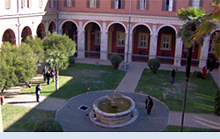 |
European Planetary Science Congress 2010
Angelicum Centre – Pontifical University of Saint Thomas Aquinas
19 – 24 September 2010, Rome, Italy |
 |
|
MT1 Preparing for Planetary VOs: Science and Tools |
| Convener: Gérard M. Chanteur | Co-Convener: Maria Teresa Capria |
|
Oral Program
/ Wed, 22 Sep, 08:30–12:00
/ Room Lecture Room 3
Poster Program
/ Attendance Tue, 21 Sep, 17:30–19:00
/ Poster Area
|
Many space missions devoted to the exploration of solar system objects are presently in operation and several others will be launched in the near future, meanwhile numerous programmes of Earth based observations of planets, including extra solar ones, are still going on, or beginning with new telescopes like ALMA. The preservation of this great wealth of observations encompassing all observational means is warranted by systematic archiving programmes driven throughout the world by space agencies and by the main ground observatories. The efficient data mining of these archives requires standards for making data repositories interoperable with protocols for accessing, searching, and retrieving data in a way as easy as possible for the front end user. The aim of Virtual Observatories is to provide users with an easy access to public data whatever are their location and archiving format, together with services to analyze and visualize data, and to offer simulation tools. The International Virtual Observatory Alliance (IVOA) and the International Planetary Data Alliance (IPDA). play a key role by issuing recommendations and promoting standards enabling the exchange of data. Astrophysical VOs are already quite advanced meanwhile Planetary VOs are just beginning due to the multiplicity of viewing points (Earth and interplanetary probes) and to the wide variety of data types and scientific disciplines in planetary sciences.
The purpose of the VO session organized at EPSC is to foster the development of VO tools and services in all planetary sciences and to offer an opportunity to planetary scientists to share their experiences and promote their projects. The session is open to all aspects of VO development and use having a potential interest for planetary sciences.

